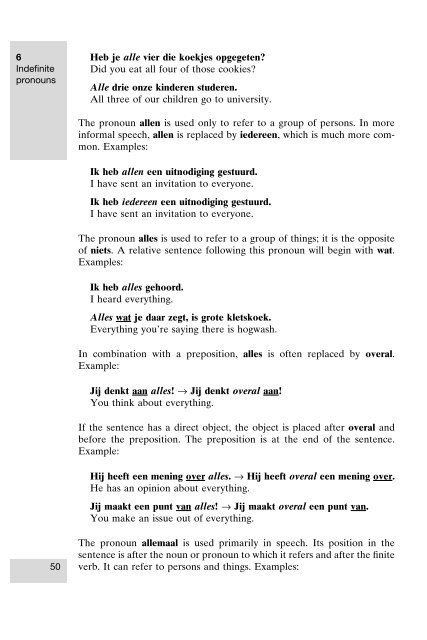er - Home
er - Home
er - Home
You also want an ePaper? Increase the reach of your titles
YUMPU automatically turns print PDFs into web optimized ePapers that Google loves.
6<br />
Indefinite<br />
pronouns<br />
50<br />
Heb je alle vi<strong>er</strong> die koekjes opgegeten?<br />
Did you eat all four of those cookies?<br />
Alle drie onze kind<strong>er</strong>en stud<strong>er</strong>en.<br />
All three of our children go to univ<strong>er</strong>sity.<br />
The pronoun allen is used only to ref<strong>er</strong> to a group of p<strong>er</strong>sons. In more<br />
informal speech, allen is replaced by ied<strong>er</strong>een, which is much more common.<br />
Examples:<br />
Ik heb allen een uitnodiging gestuurd.<br />
I have sent an invitation to ev<strong>er</strong>yone.<br />
Ik heb ied<strong>er</strong>een een uitnodiging gestuurd.<br />
I have sent an invitation to ev<strong>er</strong>yone.<br />
The pronoun alles is used to ref<strong>er</strong> to a group of things; it is the opposite<br />
of niets. A relative sentence following this pronoun will begin with wat.<br />
Examples:<br />
Ik heb alles gehoord.<br />
I heard ev<strong>er</strong>ything.<br />
Alles wat je daar zegt, is grote kletskoek.<br />
Ev<strong>er</strong>ything you’re saying th<strong>er</strong>e is hogwash.<br />
In combination with a preposition, alles is often replaced by ov<strong>er</strong>al.<br />
Example:<br />
Jij denkt aan alles! → Jij denkt ov<strong>er</strong>al aan!<br />
You think about ev<strong>er</strong>ything.<br />
If the sentence has a direct object, the object is placed aft<strong>er</strong> ov<strong>er</strong>al and<br />
before the preposition. The preposition is at the end of the sentence.<br />
Example:<br />
Hij heeft een mening ov<strong>er</strong> alles. → Hij heeft ov<strong>er</strong>al een mening ov<strong>er</strong>.<br />
He has an opinion about ev<strong>er</strong>ything.<br />
Jij maakt een punt van alles! → Jij maakt ov<strong>er</strong>al een punt van.<br />
You make an issue out of ev<strong>er</strong>ything.<br />
The pronoun allemaal is used primarily in speech. Its position in the<br />
sentence is aft<strong>er</strong> the noun or pronoun to which it ref<strong>er</strong>s and aft<strong>er</strong> the finite<br />
v<strong>er</strong>b. It can ref<strong>er</strong> to p<strong>er</strong>sons and things. Examples:


